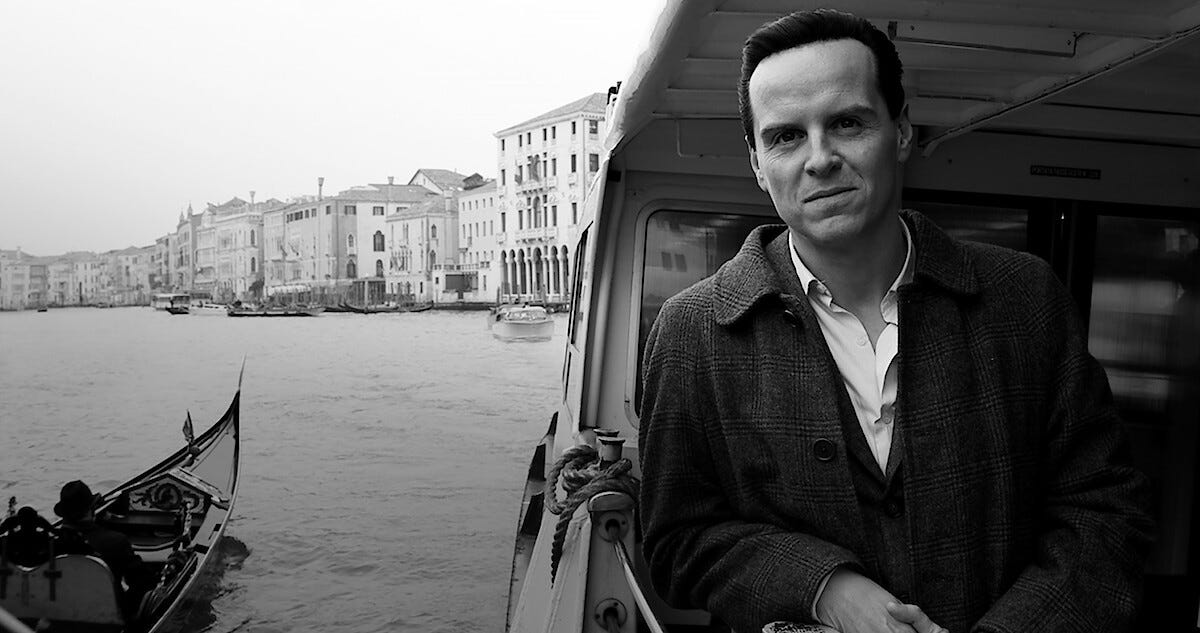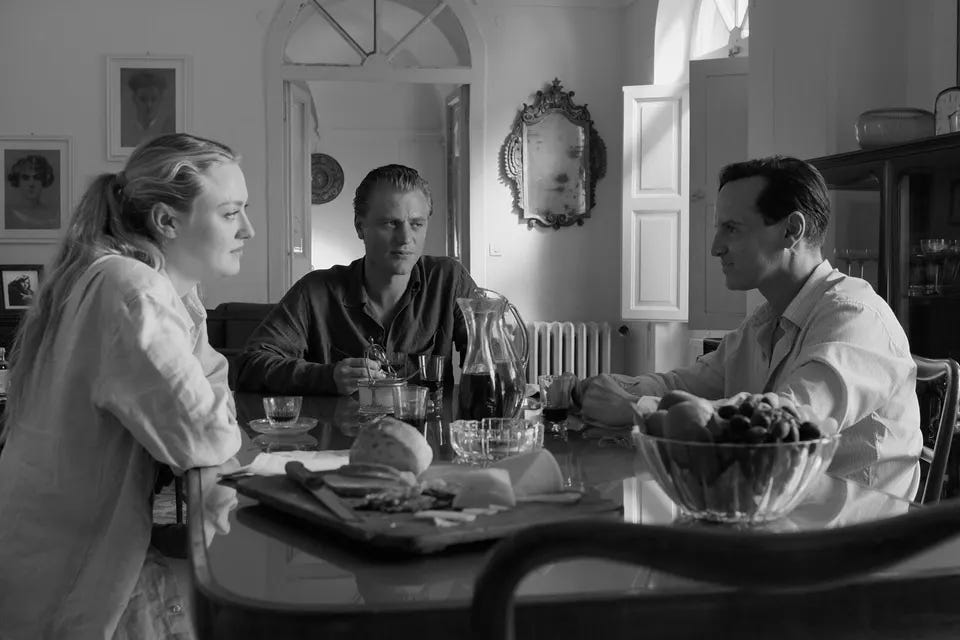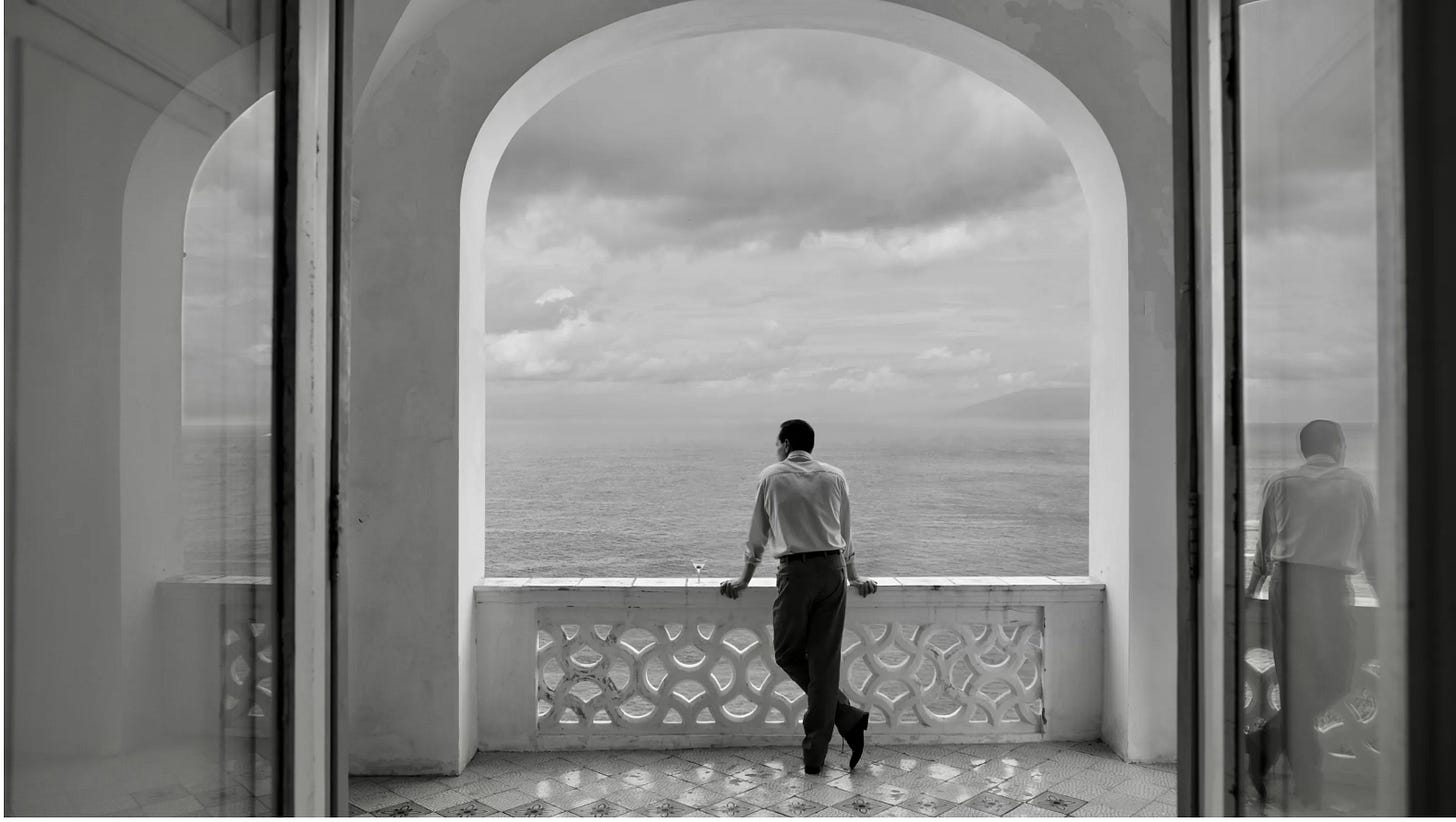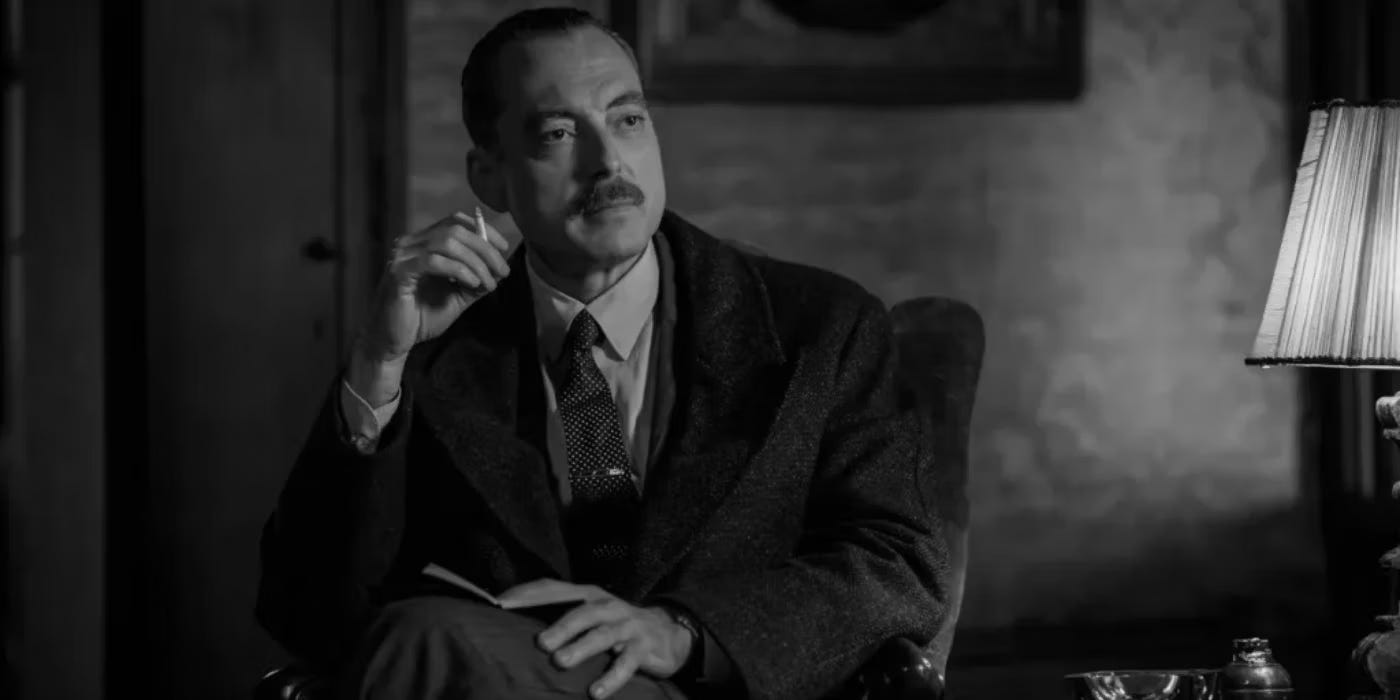“Ripley”: Believe (Its Hype) Or Not.
Beth & Patrick weigh in on one of Netflix’s most anticipated 2024 shows.
Synopsis of “Ripley”
Ripley is an adaptation of the Patricia Highsmith Ripley series (1955) which contains five books all centering around a parasitic grifter who assumes the identity of those he either kills or leaves disparaged, gaining material wealth in the process. What motivates him? Greed, envy? Lust is not high on the list in this dreary cinematic production.
As public opinion has been divided on this show with critics adoring it and every other person I speak to desperately trying to find its redemptive qualities, I asked
of to join me in a repartee to address the following questions:Does this adaptation pass muster? Or leave its audience woefully disappointed?
Does the new “Ripley” adaptation disappoint?
[POV on YES it very much does and here’s why]
It’s Boring.
Beth: At 8 episodes, each ~55 minutes, Ripley is not for the faint-hearted. From the beginning, it’s clear that director Steven Zaillian (“The Night Of”) is seeking a film noir, almost Hitchcock-ian style for the Highsmith adaptation. The coup in this is Andrew Scott (the priest from Fleabag and recently in All of Us Strangers) playing the title character. Unfortunately, even he can’t save us from the indie film school project that Robert Elswit, the series’ cinematographer (Inherent Vice, Nightcrawler, There Will be Blood, Good Night and Good Luck) and Zaillian cooked up here.
If, in your definition of a good, quality program, enjoyment is paramount, then this show fails miserably at that.
It’s so caught up in being unique stylistically and putting on airs of how clever it is, that it loses all perspective of the viewer’s entertainment. Italy is a beautiful, breathtaking country that lends itself to photogenic, colored cinematography. Why dull that with the black and white? Another issue is the pace of this show. It could easily have been cut in half. The only episodes worth watching in my opinion are 1, 3, half of 7, and 8, simply to understand how this show was wrapped up and the cliffhanger for the next season.

One final note, the actors in the series are all much older than the original film adaptation from 1999, The Talented Mr. Ripley, starring Matt Damon, Jude Law, and Gwyneth Paltrow which I think doesn’t work well, based on the arc of the story and some of the presumptions about the characters’ circumstances.
Patrick: To one of your points, I would like to say that I rather enjoyed the show’s first three episodes. At first, I enjoyed spending extra time with this version of Tom Ripley, largely because Andrew Scott is so magnetic and captivating, yes, but also because I don’t think any other screen adaptations of Highsmith’s material show how terrible Ripley is at being a con-man.
I’ve previously seen the aforementioned 1999 adaptation and caught a repertory screening of the 1960 French version, Purple Noon, a few years back. And, for obvious reasons, I decided to watch the 2002 film Ripley’s Game, featuring John Malkovich as an older Ripley, when you asked me to cover this show with you on your site. In none of those films do we see Ripley failing in his forgery or mimicry to the degree that we see Scott’s Ripley failing? However, after he takes it a little too far in the third episode, his incompetence gets a little tiring. Scene after scene, episode after episode of people calling him out on his bullshit and him weaseling his way out of it.
During the first few episodes, I said out loud in my movie room, “I kinda like spending this extra time with him. Maybe those other versions were too rushed.”
Well, I got what I wanted and more. Maybe it wasn’t the runtime of the films, maybe it’s just Ripley.
Beth: I haven’t seen Ripley’s Game with John Malkovich, yet. Although when Malkovich appeared in that 7th episode, he breathed new life into this show. For me, that moment of him calling Ripley out, in his way, and I’m inferring a bit here based on the suggestive tone of the exchange, but him identifying him as a fellow con-man, was so good. Maybe part of the fatigue in this show was seeing one actor be the sole face we see for so long. If anyone can pull that off to your point, it’s the hypnotic Scott, and yet here, he was pretty loathsome. I’m digging hard here to find redeemable things about this show. What about you?
[POV on NO it’s not all bad and here’s why]
The Andrew Scott of it All
Patrick: I don’t have to dig too deep to find things to admire about this show. I think, perhaps, its value might not add up to the sum of its parts. Andrew Scott is electric and perhaps the first version of the Ripley character (at this age) that I could totally believe. Alain Delon got away with it all because he’s so damn handsome, young Matt Damon is charming I suppose, but Scott is the complete package. He’s a versatile performer with a biting sexual hypnotism and an expressive subtlety that’s rarely found. It always seems like we get to know what he’s thinking, but the other characters don’t. Like we’re in on his secret. He’s fantastic and I believe this may be a defining role for him.
You also spoke about cinematography, a monochromatic scheme that can only exist in the modern day. The greyscale is so clear and bright and modern-looking, that it feels almost singular. Plenty of films have shown the beauty of Italy’s multiple locales, from historic architecture to beautiful beaches (The Comfort of Strangers, an excellent film, is my go-to example - particularly on the Criterion Blu-ray). Still, none have been able to do this with a black and white that emotes the country’s full vista. And Highsmith, of course, is excellent source material. Even if she gets drudged up a bit (more than a bit), she’s naturally clever and mysterious. It’s got the pieces.
Not Making Proper Use of Italy
Beth: Regarding witnessing La Belle Italy, Stealing Beauty with Liv Tyler is the film that I rank highly. Also, I’m dying to see La Chimera, now out in theaters, starring Josh O’Connor about grave robbers in Italy - mostly so I can see Italy restored in color. Just about any film shot in Italy will make use of its aesthetic charm because you’d be foolish not to (see The White Lotus, season 2)
The moment early on in episode 2 where Ripley is assessing his new rich friend, Dickie’s artwork, the pure artistry of the physical acting and facial expressions that went into Scott’s pained expressions, had me breathing a sigh of relief for this show. I hoped it would lean into these witty scenes more to balance out the weight of the rest of it, but alas, we didn’t get too much of it. Call me cynical but the part about Ripley transforming into this tragic real-life Italian artist, Caravaggio, by the end had me hopeful. If the show gets renewed, which it likely will, and art imitates life, it means that Ripley like his idol Caravaggio, will know a rather painful and early death. The bad news? It might take a few seasons.
Patrick: I also feel like my favorite supporting performances came early in the show. If it wasn’t for Malkovich, it would feel a little empty in the later episodes. Not that Scott couldn’t carry the whole thing (I just saw his one-man version of Vanya where he plays all eight characters), but I could always take some more Bokeem Woodbine. Did anybody catch that Mr. Greenleaf was played by Kenneth Lonergan, acclaimed playwright and filmmaker, best known for Manchester by the Sea? And although Johnny Flynn’s Dickie is a main character in the logistical sense, he exited a little too early. Oh! And Dakota Fanning finally feels like an adult now.
Beth: I’m with you on the caliber of the supporting actors in this film. Dakota Fanning was a delight in this and contrasted in all the best ways with Paltrow’s portrayal in The Talented Mr. Ripley. She’s suspicious of Ripley from the beginning and then her shift from distrust to almost trusting of him I found fascinating, especially as her doubts of Dickie ramped up. Johnny Flynn’s best role for me will always be in the British rom-com series Lovesick, which was formerly called Scrotal Recall, when I watched it. I had no clue that Mr. Greenleaf was Kenneth Lonergan. That’s quite a trivia fact. One other factoid is Sting’s son playing the role of Freddie Myles. I had to do a double-take there. My favorite character in this whole series was the actor playing Inspector Ravini (Maurizio Lombardi). I was rooting for him to successfully solve the crime(s).
If I can bestow a parting thought on this program is that it doesn’t live up to the hype or earn the critics’ praise. If I hadn’t committed to reviewing this with you, I’m not sure I would have made it through all of the episodes. And that’s saying something.
Patrick: I have to admit that I was looking for the pacing to pick up, which it didn’t. Do we need to see the disposing of a body in real-time? I was hoping for a little more suspense. Obviously, the source material is textbook noir, but you have to have that attitude in the filmmaking as well. Shooting it in black and white is not enough. I don’t think Zaillian approached it the way that many of us see it in our heads. Is that our problem? To an extent. But watching Ripley drown for half an hour would bother Robert Mitchum and Alan Ladd more than it bothered me. Reapproached, it’s five great episodes. In this form, it’s a meandering eight.
Beth: It’s a solid 2.5 episodes for me. That’s not too bad. Also, I’d love to Summer in the Venice palazzo (former Caravaggio residence) that Ripley ends up in, and pray that I don’t slip on the moss into the canal. If I did succumb to this fate, however, you’d know who did it.
Thanks for taking the time to stop by, Patrick, and give this show the once over. We did a good job of not relaying (too many) spoilers, I hope…
Let’s Discuss
Now, tell me what you think.
Did Ripley underwhelm?
Will you give it another season?
What do you think Marge is up to in the post-S1 timeline?
After seeing the last few moments of the finale, I’m looking forward to more of Inspector Ravini. You?
What’s your favorite Ripley adaptation?














Hubby and I couldn’t get through the first episode. We thought maybe it was because we were tired. 🥱
I thought The Queen’s Gambit was the most beautifully shot TV series I had seen and then I watched ‘Ripley.’ Every single frame is a beautifully composed B&W photograph. I thoroughly enjoyed the series and thought it came across as a homage to Hitchcock.